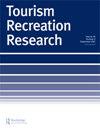Complementarity: bridging the tourism academic/religion divide
IF 2.6
Q1 HOSPITALITY, LEISURE, SPORT & TOURISM
引用次数: 0
Abstract
The idea that theistic and mono-theistic beliefs are misguided is long standing and based on the ‘reasoned’ arguments of scientific luminaries such as Charles Darwin, Stephen Hawking, and Bertrand Russell, etc. (Dixon & Shapiro, 2022). Scientific knowledge, they argued is premised on the basis of observations and incremental reasoning of the natural world (Gower, 1997). The sense of what it means to be human – freedom, ethics, personal and societal values and an effort to understand our place in the universe – not only do not require the presence of a God or Gods, but in arguing that we can devolve responsibility for our rationale thinking to religious belief, we are trusting in a ‘religious method [that] is refuted by its failure’ (Stenger in INCH, 2014). Science and the scientific method have long been recognised as one of the foundational disciplines of tourism knowledge (Tribe & Liburd, 2016; Urano et al., 2022). Schweinsberg (2023) has built on this disciplinary framework in this special issue, arguing that religious faith can serve as a values-based meta narrative governing an academic’s sense of self as they seek to engage with different disciplinary perspectives. What he did not consider, however, was how academics who have a religious faith might engage constructively with tourism practices, which conflict with their own faithbased perspective. Could I as a person of faith argue that abortion tourism should be developed in a particular destination, so long as it adheres to a particular political regulatory framework? Similarly, could I recommend the establishment/ expansion of a redlight district in a township if I could prove its economic value for the region? Hollinshead (2010) once asked the Academy to look beyond its traditional colonialist and economic framings and embrace a truly post-disciplinary interpretation of knowledge. This paper asks a follow-on question; how can new knowledge producers reconcile their idea of ‘truth’ to the rationalist socio-political and economic imperatives upon which the tourism industry still ultimately relies? Tourism scholars are frequently asked to critically investigate forms of tourism, which can be seen by many in society to be ethically suspect including sex tourism, child sex tourism, suicide tourism, fertility/ reproductive tourism, abortion tourism, and slum tourism. The economic importance of such industries is well documented in particular destination localities (e.g. Brooks & Heaslip, 2019; Guiney & Mostafanezhad, 2015). However, underpinning all of the afore mentioned tourism sectors are also wider societal issues regarding: the sanctity of life; cultural stigmatisation; the marginalisation of the ‘other’, respect or disrespect of privacy, and unequal power relations; all of which religious institutions have strong, often negative opinions on (e.g. Huschke & Schubotz, 2016; Masci, 2016). Carr (2016) suggests with respect to sex tourism that academics should find ways to engage with contentious tourism in all its forms as a means of illuminating the darkest parts of the world. But, to what end? If our goal is to advocate for principles of love, respect, generosity, and forgiveness for all people then these are互补性:弥合旅游学术/宗教的鸿沟
有神论和一神论信仰被误导的观点长期存在,并基于科学名人的“理性”论点,如查尔斯·达尔文、斯蒂芬·霍金和伯特兰·罗素等(Dixon & Shapiro, 2022)。他们认为,科学知识是建立在对自然界的观察和渐进推理的基础上的(高尔,1997)。作为人类的意义——自由、伦理、个人和社会价值,以及努力理解我们在宇宙中的位置——不仅不需要上帝或诸神的存在,而且在争论我们可以将我们的基本原理思考的责任转移到宗教信仰时,我们相信一种“被其失败所驳斥的宗教方法”(Stenger in INCH, 2014)。科学和科学方法一直被认为是旅游知识的基础学科之一(Tribe & Liburd, 2016;Urano et al., 2022)。Schweinsberg(2023)在本期特刊中以这一学科框架为基础,认为宗教信仰可以作为一种基于价值观的元叙事,在学者寻求与不同学科观点接触时,控制他们的自我意识。然而,他没有考虑的是,有宗教信仰的学者如何建设性地参与与他们自己基于信仰的观点相冲突的旅游活动。作为一个有信仰的人,我是否可以主张,只要遵守特定的政治监管框架,堕胎旅游就应该在某个特定的目的地发展?同样,如果我能证明红灯区对该地区的经济价值,我是否可以建议在一个乡镇建立/扩大红灯区?Hollinshead(2010)曾要求学院超越其传统的殖民主义和经济框架,拥抱真正的后学科知识解释。本文提出了一个后续问题;新的知识生产者如何将他们的“真理”观念与旅游业最终依赖的理性主义社会政治和经济要求协调起来?旅游学者经常被要求批判性地调查各种形式的旅游,这些旅游在社会上被许多人认为是道德上可疑的,包括性旅游、儿童性旅游、自杀旅游、生育/生殖旅游、堕胎旅游和贫民窟旅游。这些行业的经济重要性在特定的目的地地区得到了充分的证明(例如Brooks & Heaslip, 2019;Guiney & Mostafanezhad, 2015)。然而,支撑上述所有旅游部门的还有更广泛的社会问题:生命的神圣性;文化因为;对“他者”的边缘化,对隐私的尊重或不尊重,以及不平等的权力关系;所有这些宗教机构都有强烈的,通常是负面的意见(例如Huschke & Schubotz, 2016;∙马希2016)。卡尔(2016)建议,关于性旅游,学者们应该找到方法,以各种形式参与有争议的旅游,作为照亮世界上最黑暗地区的一种手段。但是,为了什么呢?如果我们的目标是倡导爱、尊重、慷慨和宽恕所有人的原则,那么这些就是
本文章由计算机程序翻译,如有差异,请以英文原文为准。
求助全文
约1分钟内获得全文
求助全文
来源期刊

Tourism Recreation Research
HOSPITALITY, LEISURE, SPORT & TOURISM-
CiteScore
11.30
自引率
7.10%
发文量
77
期刊介绍:
Tourism Recreation Research is a multidisciplinary international journal now published quarterly; it focuses on research problems in various tourism and recreational environments — ecological, economic, and socio-cultural — and attempts to seek solutions for sustainable development. Contributions are also encouraged on fundamental research concepts and theories. The journal carries regular features such as Research Note, Post-Published Reviews and Book Reviews. The ‘Research Note’ provides opportunity for scholars who have attained sufficient maturity to establish reliable findings in their field of research. The ‘Post-Published Review’ section has been introduced to capture deep insights into the papers that have already been published in Tourism Recreation Research to fill in gaps in the received information. Strong emphasis is laid on original research and readable prose.
 求助内容:
求助内容: 应助结果提醒方式:
应助结果提醒方式:


